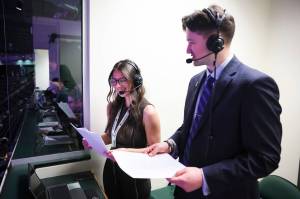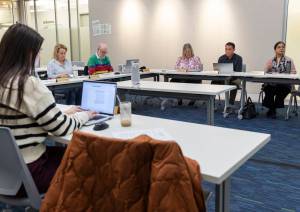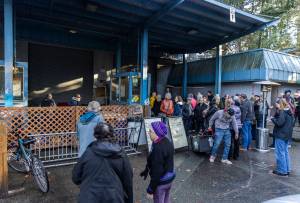Neighbors spar with county: Whose land is it, anyway?
Published 11:18 pm Saturday, January 19, 2008
SNOHOMISH — Feuding neighbors Bruce Karr and Murphy Russell both say they weren’t looking for trouble.
“I’m a peaceful guy,” said Karr, who helps troubled kids at his Christian ministry. “I’ve tried to get along.”
“I stay to myself,” said Russell, who has his hands full selling used cars and trucks and fighting cancer. “I don’t cause any trouble. I’m not looking for a fight.”
Even so, the two have been locked in an escalating border dispute since Russell started selling used cars next door six years ago.
There’s no end in sight, and even as parts of their fight head into hearings, both men say they’re angry with Snohomish County for letting things go this far.
“There has to be some type of rules or it’s the Wild West,” Karr said. “The county has to control it or it’s going to get out of control.”
As Karr and Russell trade barbs over how each other uses his land, they invoke a larger debate of what development should be allowed on farmland.
The county is investigating whether Karr and Russell went too far in changing the protected agricultural landscape.
Pressure on farmland
The two men own about a dozen acres of what the county considers fertile farmland and Pilchuck River flood plain. For years, they’ve operated at the edge of what the county allows on the land.
Only after receiving complaints against the two did the county open investigations into what they were doing — including adding gravel driveways and buildings on the sites without permission.
More often, no one complains and the county leaves property owners to themselves — including owners of farmland.
At the same time, the county is gung ho to preserve farmland. It was a key plank in County Executive Aaron Reardon’s re-election campaign.
Of 63,000 acres of land designated as agricultural in the county, only 33,000 are actually being used for farm-related activities.
Owners of farmland feel pressure to make ends meet, and are tempted to turn to housing, or change the open spaces into sports fields or businesses.
It’s not just a problem here. In Skagit County, activists want to draw a “green line” and buy up rings of farmland around cities to prevent the steady outward creep of development, said Allen Rozema, executive director of Skagitonians to Preserve Farmland.
“We’re seeing the pressure for conversion all the time,” he said. “We’re seeing erosion on fringes of the urban growth areas.”
On Karr’s and Russell’s land, just outside the city limits of Snohomish, the buildings and business supplant its use as potential farmland.
“You see that not only here, but all across the United States near our metropolitan areas, a kind of a creeping loss of agricultural land,” said Cliff Bailey, a Snohomish farming advocate and former farmer. “You can’t get that land back because it’s usually grandfathered in, used for other purposes — and it’s gone.”
The county’s farmland is “gradually being eaten away by various kinds of developments, some small and some large,” he said. “As our population grows, we’re going to see farmland disappear faster.”
Snohomish County has wrestled before with the threat to farmland. It has tried to boost markets for biofuel crops, bought up development rights to preserve farmland and struggled to create programs to steer development away from farms and into urban areas.
An effort to preserve farmland and boost the economy for farmers is always a priority, Reardon said.
“I want to preserve all the existing farmland in Snohomish County, both the land being harvested now and not being harvested and under significant development pressure,” Reardon said.
The legacy of the car lot and Christian ministry are cases that “have an impact on viable farmland,” Reardon said. “The challenge is the county has to follow the law, and have policies that are predictable so people know what’s expected.”
Even as some of the county’s farmland is being built on, other fallow land is being planted for the first time in years, Reardon said. A detailed study is under way of how many acres are in play.
There are strict limits on what can and cannot be built on agricultural land such as Karr’s and Russell’s.
Officials allow farm-related buildings and businesses, but they also opened up farmland for kennels and events such as weddings. In some cases, the county allows farmland to be used for bed-and-breakfast hotels, golf courses, driving ranges and park-and-ride lots.
All these things reduce the number of acres of farmland in the county and bear watching, farm advocates said.
The county is working closely with rural property owners to keep farmland viable. When property owners run afoul of land-use rules, Reardon said many quickly toe the line voluntarily.
When they don’t, “we will follow the law and pursue cleanup with vigor,” he said.
Urbanization, bit by bit
When property owners don’t go asking for permits, rural properties and farmland have a casual way of evolving.
Add a building here, a load of gravel there, and over the course of a decade rural land can become decidedly urban.
Even though there are no crops in the ground, Karr said his land has “farm flavor.” He has a tangle of neon-bright shed buildings that make up what he calls a “mini-Disneyland” in Snohomish. He has a zebra and exotic birds. Dozens of kids work off their community service on the four-acre property.
Each of his buildings are so small they don’t need permits, Karr said.
A large tent on the land also is allowed if he periodically renews the permit with the county.
Still, earlier this month he was hit with a complaint made to the county over those buildings.
Next door, Russell said his car lot covers only a fraction of his agricultural land. He has a few dozen used cars and trucks for sale on part of his nearly eight-acre property. He brought in two portable trailers for business offices and banks of bright lights. He also has a paintball field out back.
County code enforcement officers moved this month to rein in Russell’s car lot after receiving complaints about alleged land-use violations. They ordered Russell to shrink the size of his business and remove two business trailers and gravel placed without permits.
Otherwise, he faces daily fines. He has appealed the order.
Russell said he is within his rights to run a car lot, and the county agrees.
The county now is taking a harder look at how large a car lot should be allowed to remain on the farmland.
Seeds of a dispute
Russell, a veteran car salesman, bought the lot in 2001. The business was a going concern, and it wasn’t on the county’s radar because there wasn’t a complaint.
Things quickly soured between the neighbors over use of a previous shared gravel parking area on Russell’s land. Over time, Russell has laid down more gravel and brought in two business trailers and more cars.
The county investigated Russell’s car lot in 2004 and determined that the property had been the site of used car sales since at least the 1960s.
That meant it could stay.
“I purchased it as a car lot,” Russell said. “I’m just trying to make a living and get along and do what I’m doing.”
The county today handles acceptable uses of all land differently. A code expert reviews whether a business — like a car lot on farmland — should be allowed.
“I believe the decision we made back then is very defensible,” Planning and Development Services director Craig Ladiser said. “Once we take that position, we give the property owner the right, unless something changes.”
Since a second complaint was filed against Russell in 2006, he has spent an estimated $50,000 so far as he tried to get proper permits, said Dan Reina, his land-use consultant.
The permits are still pending. Meanwhile, the county on Jan. 3 ordered him to remove his two business trailers, as well as any gravel placed there without permits. In addition to being farmland, the property also is in the flood plain of the Pilchuck River, and the use of gravel is restricted.
Russell was given until Jan. 31 to comply or face fines. A county hearing examiner will be reviewing his case and any penalties are on hold until then.
Conversion of farmland is one of the biggest threats the county faces, Ladiser said.
“When you start bringing structures in, you’re breaking the rules,” he said. “That’s what we’re enforcing.”
The county also is investigating fresh complaints next door at The Farm.
The complaint alleges Karr encroached on wetlands, built 15 to 20 buildings without permits, and operates a petting zoo with exotic animals without proper clearances.
Karr said the county has been to his property multiple times and he has always made requested fixes.
“I look forward to the county coming out,” Karr said.
‘We need to be fair’
Many agree that owners of rural property often need ways to make ends meet.
Reina, Russell’s consultant, said one way would be to allow landowners to put businesses next to busy roads, and keep protecting farmland out back. It’s something that happens across rural areas all over the county and state.
County Council chairman Dave Somers is tracking the issue.
He said he believes the car dealership showed up a few years ago.
“If in fact it was a prior use, and they were legal at one point, we allow them to continue as nonconforming,” Somers said. “But that’s a real question in this situation.”
A bright line to protect farmland is needed, Somers said.
Car dealer Dwayne Lane of Everett has fought for almost two decades to build a car lot on land he owns in Arlington that is designated as farmland.
His fight is heading for the state Supreme Court.
“The same rules apply to (Russell and Karr) as did to Dwayne Lane,” Somers said. “We need to be clear with the rules and we need to be fair.”
On Friday, Karr continued to sow the seeds of responsibility in troubled kids who came to his property. Next door, Russell’s employees continued to sell his bumper crop of used cars and trucks.
The evolution of Snohomish County’s farmland marched on.
Reporter Jeff Switzer: 425-339-3452 or jswitzer@heraldnet.com.




